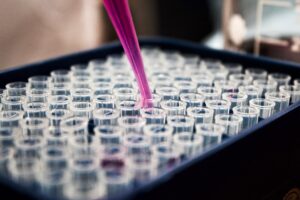 Rubbers used in manufacturing medical-grade o-rings, tubing, seals, and like parts found in medical applications and devices are subject to different quality standards than rubbers used in other industries. Though rubber is a natural product, most rubbers on the market today are made of different elastomers, and synthetic polymers with elastic properties. Food-grade and medical-grade elastomers must not only hold certain mechanical properties required for the application, for example, resistance to acids, chemicals, and solvents, withstand temperature extremes or have sterilization capabilities, but also offer biocompatibility when necessary.
Rubbers used in manufacturing medical-grade o-rings, tubing, seals, and like parts found in medical applications and devices are subject to different quality standards than rubbers used in other industries. Though rubber is a natural product, most rubbers on the market today are made of different elastomers, and synthetic polymers with elastic properties. Food-grade and medical-grade elastomers must not only hold certain mechanical properties required for the application, for example, resistance to acids, chemicals, and solvents, withstand temperature extremes or have sterilization capabilities, but also offer biocompatibility when necessary.
Medical-grade rubbers are made with compounds that must meet USP Class VI or ISO 10993 standards to be certified as biocompatible. Under normal circumstances, the rubber compounds must be able to perform as intended without the patient having an adverse or harmful reaction during biological interactions with the material. That means rubber or elastomeric material used as component parts in medical devices, applications, and equipment are subject to FDA scrutiny. Though the criteria for FDA approval of a medical device or application is not based on each part of the finished product, the materials used for those components can affect the outcome one way or the other.
One of the more common rubbers used in medical applications is silicone. With excellent thermal stability and temperature resistance, silicone is non-toxic, biocompatible, and can undergo several sterilization methods without affecting its properties. These methods include steam autoclaving, ethylene oxide, dry heat, gamma radiation, and electron beams. Silicone rubber is used in medical components and devices such as tubing, valves, o-rings, catheters, drainage tubing, gaskets, and artificial membranes.
Standard and Custom Medical-Grade Rubber Components
Manufacturer’s Rubber and Supply offers a wide range of standard and custom-made medical-grade rubber parts and components for various medical applications. Leading medical-grade elastomers include silicone, Viton®, and Ethylene Propylene (EPDM). Some of our more common products used in medical devices and equipment are:
O-Rings and Gaskets
O-Rings and gaskets are seals and integral components found in numerous mechanical systems. They can be used in either static or dynamic applications to join and serve similar purposes—to effectively join and seal mated surfaces between parts to reduce friction, resist pressure, and prevent gasses, fluids, or lubricants from exiting as well as entering between mated surfaces.
Rubber used in medical-grade o-rings and gaskets is manufactured with materials such as silicone or EPDM. They are used in various applications ranging from cylinders or valves in medical equipment to drug delivery systems; they are found in machinery and equipment in healthcare centers, hospitals, and research facilities. Medical-grade o-rings are used in respiratory equipment such as masks and ventilation apparatuses, fittings, valves, connectors, tubing, filtration devices, regulators, and syringes.
Gaskets used in medical devices and equipment can protect against contaminants like dirt, dust, and fluids and prevent electromagnetic interference (EMI). Mechanical properties of medical-grade gaskets may also provide flame resistance, electrical conductivity, and protection against electrostatic discharge (ESD).
PTFE Joint Sealant
Though PTFE joint sealant tape is often associated with sealing threaded pipe connections in plumbing applications, its use in medical applications is regarded for its biocompatibility and chemical-resistant properties. Whether to securely seal glass-lined flanges or sealing gas handling equipment, medical-grade PTFE tape is necessary for various devices used in diagnostic testing and diagnostic equipment. Medical-grade PTFE tape will not lose its properties in the presence of UV Light or exposure to such sterilization techniques as EB, EtO, Gamma, and microwave, and has a temperature range from -450 deg F up to 550 deg F.
Lab Stoppers
Lab stoppers are a type of rubber plug used to safely and securely seal laboratory vessels such as test tubes, flasks, lab bottles used to conduct testing and experiments, medical bottles used in test kits, or glassware used for storage of chemicals, prevent leakage of fumes, and other related functions found in laboratory environments. Stoppers are cylindrical or conical by design and tapered to fit into laboratory vessels securely. They come in a range of sizes as well as configurations, such as no hole, one hole, or two holes. Depending on the application requirements, materials range from SBR and natural rubber to neoprene, silicone, and other food-grade and medical-grade elastomers.
For more information on medical-grade rubber for your application, contact Manufacturer’s Rubber and Supply.


